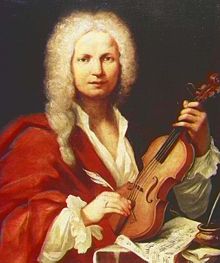- Dorilla in Tempe
-
Antonio Vivaldi  Operas
Operas- Ottone in villa (1713)
- Orlando finto pazzo (1714)
- Nerone fatto Cesare (1715)
- Arsilda, regina di Ponto (1716)
- La costanza trionfante (1716)
- L'incoronazione di Dario (1717)
- Tieteberga (1717)
- Armida al campo d'Egitto (1718)
- Scanderbeg (1718)
- Teuzzone (1719)
- Tito Manlio (1719)
- La verità in cimento (1720)
- La Silvia (1721)
- Ercole su'l Termodonte (1723)
- Dorilla in Tempe (1726)
- Farnace (1727)
- Orlando furioso (1727)
- Argippo (1730)
- Motezuma (1733)
- L'Olimpiade (1734)
- Bajazet (1735)
- Griselda (1735)
Dorilla in Tempe is a melodramma eroico pastorale in three acts by composer Antonio Vivaldi with an Italian libretto by Antonio Maria Lucchini. The opera premiered at the Teatro San Angelo in Venice on 9 November 1726. Vivaldi later revised the opera numerous times for several difference performances throughout the second half of his career.
Contents
History
Dorilla in Tempe was well received at its premiere and became one of Vivaldi's personal favorites. The opera was the first work by Vivaldi to include in its cast the mezzo-soprano Anna Girò, who went on to form a lifelong friendship and professional partnership with the composer. The opera was also noted for its visual aspects, boasting some of the most elaborate sets (by Antonio Mauro) in the history of opera up to that point and for its beautiful choreography by Giovanni Galletto.
In 1728 the opera was revived at the small Teatro San Margherita in Venice with an almost identical text, and again in Prague at the Sporck Theatre in the spring of 1732, this time with substantial alterations to the libretto. During Carnival 1734 the opera was revived at the Teatro San Angelo, this time as a pastiche using recent music by other composers, including Hasse, Giacomelli and Leo.
Music
The only surviving score of Dorilla in Tempe, located in Turin, is from this 1734 pastiche production. Fortunately, the score includes not only the many insertions into the opera but also a number of the deletions from earlier productions. Unusually for Vivaldi’s operatic scores, the sinfonia is clearly linked with the main opera: it follows the title-page instead of preceding it, and the music of its final movement – a C major version of the opening of the Spring concerto– reappears in the opera’s opening chorus, appropriately in praise of spring. The opera displays a pastoral nature, particularly in its choral and ballet music, that is at times mixed with heroic elements, as in the elaborate celebrations at the end of Act 2, where a hunt is enacted to the inevitable horn accompaniment.
Roles
Role Voice type Premiere Cast,[1]
9 November 1726Dorilla, daughter of Admeto, in love with Elmiro soprano Angela Capuano, "la Capuanina" Admeto, King of Thessaly bass Lorenzo Moretti Nomio/Apollo, the god Apollo disguised as a shepherd, in love with Dorilla contralto castrato Filippo Finazzi Elmiro, a shepherd, in love with Dorilla soprano (breeches role) Maria Maddalena Pieri Eudamia, a nymph, in love with Elmiro mezzo-soprano Anna Girò Filindo, in love with Eudamia contralto castrato Domenico Giuseppe Galletti Synopsis
The story takes place in Tempe. Like the music, the plot intertwines pastoral and heroic elements and centers on the shepherd Nomio, who is in fact Apollo in disguise. Nomio falls in love with Dorilla, the daughter of Admeto, King of Thessaly, who is herself in love with the shepherd Elmiro. Admeto is forced by the gods to save his kingdom by offering his daughter as a sacrifice to the sea-serpent Pitone, but she is rescued just in time by Nomius. Nomius claims the hand of Dorilla as his reward, but she remains reluctant and escapes with Elmiro. The pair are captured, and Elmiro is sentenced to death. Finally, however, the intervention of Nomius, revealing his divine identity, saves the situation and Dorilla and Elmiro are reunited.
Recordings
- 1994 Dorilla: María Cristina Kiehr, Elmiro: John Elwes, Admeto: Philippe Cantor, Nomio/Apollo: Jean Nirouët. Ensemble Baroque de Nice, Gilbert Bezzina Opéra de Nice 1994,2008[2]
Sources
- Eric Cross: "Dorilla in Tempe", Grove Music Online ed. L. Macy (Accessed November 21, 2008), (subscription access)
References
- ^ italianopera.org, accessed 16 December 2010
- ^ 2008 reissue states libretto available online, but link defunct April 2010
Categories:- Operas
- Operas by Antonio Vivaldi
- 1726 operas
- Italian-language operas
- Operas based on Greco-Roman mythology
Wikimedia Foundation. 2010.
